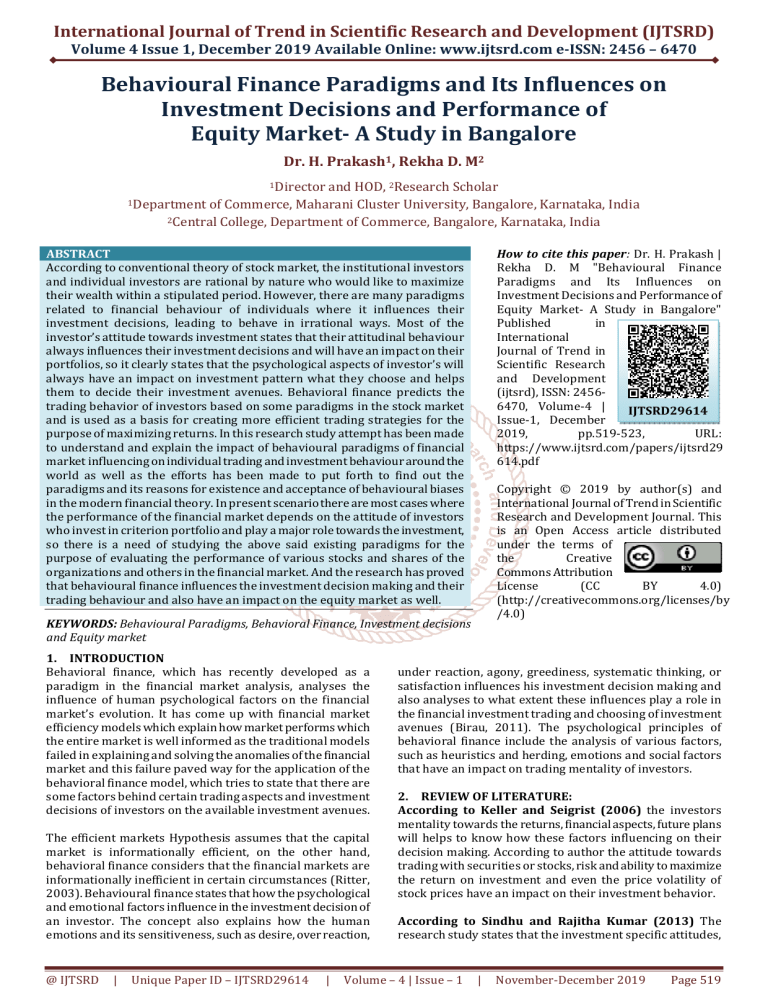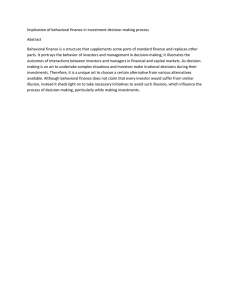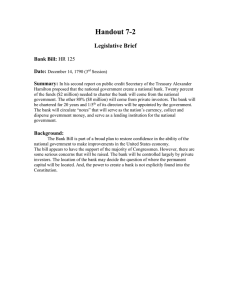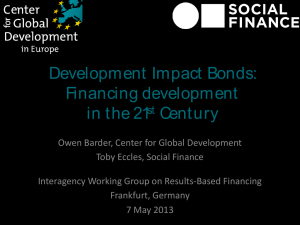
International Journal of Trend in Scientific Research and Development (IJTSRD)
Volume 4 Issue 1, December 2019 Available Online: www.ijtsrd.com e-ISSN: 2456 – 6470
Behavioural Finance Paradigms and Its Influences on
Investment Decisions and Performance of
Equity Market- A Study in Bangalore
Dr. H. Prakash1, Rekha D. M2
1Director
and HOD, 2Research Scholar
1Department of Commerce, Maharani Cluster University, Bangalore, Karnataka, India
2Central College, Department of Commerce, Bangalore, Karnataka, India
ABSTRACT
According to conventional theory of stock market, the institutional investors
and individual investors are rational by nature who would like to maximize
their wealth within a stipulated period. However, there are many paradigms
related to financial behaviour of individuals where it influences their
investment decisions, leading to behave in irrational ways. Most of the
investor’s attitude towards investment states that their attitudinal behaviour
always influences their investment decisions and will have an impact on their
portfolios, so it clearly states that the psychological aspects of investor’s will
always have an impact on investment pattern what they choose and helps
them to decide their investment avenues. Behavioral finance predicts the
trading behavior of investors based on some paradigms in the stock market
and is used as a basis for creating more efficient trading strategies for the
purpose of maximizing returns. In this research study attempt has been made
to understand and explain the impact of behavioural paradigms of financial
market influencing on individual trading and investment behaviour around the
world as well as the efforts has been made to put forth to find out the
paradigms and its reasons for existence and acceptance of behavioural biases
in the modern financial theory. In present scenario there are most cases where
the performance of the financial market depends on the attitude of investors
who invest in criterion portfolio and play a major role towards the investment,
so there is a need of studying the above said existing paradigms for the
purpose of evaluating the performance of various stocks and shares of the
organizations and others in the financial market. And the research has proved
that behavioural finance influences the investment decision making and their
trading behaviour and also have an impact on the equity market as well.
How to cite this paper: Dr. H. Prakash |
Rekha D. M "Behavioural Finance
Paradigms and Its Influences on
Investment Decisions and Performance of
Equity Market- A Study in Bangalore"
Published
in
International
Journal of Trend in
Scientific Research
and Development
(ijtsrd), ISSN: 24566470, Volume-4 |
IJTSRD29614
Issue-1, December
2019,
pp.519-523,
URL:
https://www.ijtsrd.com/papers/ijtsrd29
614.pdf
Copyright © 2019 by author(s) and
International Journal of Trend in Scientific
Research and Development Journal. This
is an Open Access article distributed
under the terms of
the
Creative
Commons Attribution
License
(CC
BY
4.0)
(http://creativecommons.org/licenses/by
/4.0)
KEYWORDS: Behavioural Paradigms, Behavioral Finance, Investment decisions
and Equity market
1. INTRODUCTION
Behavioral finance, which has recently developed as a
paradigm in the financial market analysis, analyses the
influence of human psychological factors on the financial
market’s evolution. It has come up with financial market
efficiency models which explain how market performs which
the entire market is well informed as the traditional models
failed in explaining and solving the anomalies of the financial
market and this failure paved way for the application of the
behavioral finance model, which tries to state that there are
some factors behind certain trading aspects and investment
decisions of investors on the available investment avenues.
The efficient markets Hypothesis assumes that the capital
market is informationally efficient, on the other hand,
behavioral finance considers that the financial markets are
informationally inefficient in certain circumstances (Ritter,
2003). Behavioural finance states that how the psychological
and emotional factors influence in the investment decision of
an investor. The concept also explains how the human
emotions and its sensitiveness, such as desire, over reaction,
@ IJTSRD
|
Unique Paper ID – IJTSRD29614
|
under reaction, agony, greediness, systematic thinking, or
satisfaction influences his investment decision making and
also analyses to what extent these influences play a role in
the financial investment trading and choosing of investment
avenues (Birau, 2011). The psychological principles of
behavioral finance include the analysis of various factors,
such as heuristics and herding, emotions and social factors
that have an impact on trading mentality of investors.
2. REVIEW OF LITERATURE:
According to Keller and Seigrist (2006) the investors
mentality towards the returns, financial aspects, future plans
will helps to know how these factors influencing on their
decision making. According to author the attitude towards
trading with securities or stocks, risk and ability to maximize
the return on investment and even the price volatility of
stock prices have an impact on their investment behavior.
According to Sindhu and Rajitha Kumar (2013) The
research study states that the investment specific attitudes,
Volume – 4 | Issue – 1
|
November-December 2019
Page 519
International Journal of Trend in Scientific Research and Development (IJTSRD) @ www.ijtsrd.com eISSN: 2456-6470
such as awareness of market, the knowledge of investors,
investment patterns, risk attitudes, loss aversion and
management of investment, showed a major influence on the
decision making of the investors.
Raju and Patra (2016) conducted a survey which identified
the role played by the attitudinal factors in deciding the
investment avenues of the investor. The study revealed that
the attitudinal factors, including the sectoral of company
which is chosen for investment, the profit earning ability,
company history and background and Company's value in
the equity market, etc. are the factors influencing the
investment decisions of the investor.
According to Prakash, Awaiz and Warraich (2014) the
variation in the different Socio economics characteristics,
such as age, gender, occupation, income, marital status etc.
with respect to the social communities in the society
influences the investment decisions. The study also revealed
that there is no much differences among the investors who
have given responses for the study and who are from various
communities in their choice of taking the investment
decisions.
Gumus and Dayioglu (2015) analyzed the influence of
socioeconomic and demographic factors, including education
of investors their income level and marital status, age,
gender, and the occupation, in determining investors’
investment decisions and states that it will have a influence
on investment trading and decisions.
When it comes to certain behavioural factors which is going
to influence the investment decisions certain review have
been made as below:
Shabarisha (2015): He explains that the role of heuristics
behavioural factor and other biases will determine the
decision making of investors. The data accounting to nine
heuristic and bias factors, including representativeness,
Anchoring, Overconfidence, Gamblers Fallacy, Availability,
Loss Aversion, Regret Aversion, Mental Accounting and Selfcontrol Biases, were taken into consideration for analysis.
Further it demonstrated that there is a difference among
experienced investors and new investors of the financial
market who behave differently while taking investment
decisions.
Donkor, Akohene and Acheampong (2016) examined
whether the heuristic factors, including overconfidence and
anchoring have an impact on the investment decisions of the
investors in Ghana. The research states that the bankers
often tend to be overconfident during the making of
investment decisions. Furthermore, the decisions were also
influenced by the experience of their past performance of
investments made by them, which suggested the presence of
anchoring effect of behavioral factor.
Bakar and Yi (2016): In his research analyzed the impact of
psychological factors on the decision making process of the
investors in Malaysia. The research says that the influence of
the factors such as overconfidence, and availability bias on
the investors’ decisionmaking, however, highlighted the fact
that the herding behavior possessed zero significant
influence on the investors’ decision making process.
@ IJTSRD
|
Unique Paper ID – IJTSRD29614
|
Agarwal, Singhal and Swarup (2016): The study revealed
that the influence of herding behavior will have an impact on
the investment decision of the investor and causes for the
existence of herding behavior among investors in India. It
also examines that the herding behavior had a significant
impact on the investment decisions of the Indian investors
because the lack of knowledge regarding the stock market
functioning and the financial literacy.
3. Research Gap
After conducting a thorough survey and reviews this study
has found some research gaps which is taken into
consideration for the research study. The previous reviews
failed to concentrate on the constituents of factors (limited
factors were considered for the study) which are going
influence the investment decision making of investors where
various factors were totally neglected which comes to
attitudinal factors. When it comes to socio economic factors
some authors agreed of its influence and others gave a
contradictories in analysis which paved a way for further
study on this matter. The major drawback from the above
review in case of behavioral factors encountered the lack of
sufficient studies in the Indian context, specifically in the
context of Bangalore, which is cosmopolitan city with
diversity in demographical profile. The lack of
comprehensive studies of all constituents which have an
impact of behavioral factors on investment decision making
were not present in their research studies.
4. Objectives of the Study
To study the psychological factors influencing investment
decision in the equity market.
To investigate the role played by demographic aspects of the
investors in determining their investment decisions.
To study the impact of behavioural factors on the
performance of the investment decision and building
portfolio.
5. Statement of Problem
The well development of financial market is purely
dependent on the financial flow as investment into the
companies as it is majorly dependent on the large capital
flow for their operations and development. In this regard it
is looking towards stock market. A positive trend in the stock
market will definitely contribute towards the development
of the economy and vice versa. This is purely dependent on
investor’s investment in the financial market. Since the
investors are very cautious and sensitive to internal and
external factors which influence their decision making
process which has given way for the study of sociopsychological factors. Taking this into consideration, the
present study attempts to understand the influence of the
behavioral factors on the investors’ decisions on their
investment and their trading behaviour.
6. Hypothesis
H1: Psychological factors of investor’s have significant
influence on the investment decision
H2: Behavioural factors of investor’s behavior will have
significantly impacts the investment decision and its
performance on equity market.
7. Research Methodology
Since the study is descriptive and explanatory in nature
quantitative research is conducted to establish the
Volume – 4 | Issue – 1
|
November-December 2019
Page 520
International Journal of Trend in Scientific Research and Development (IJTSRD) @ www.ijtsrd.com eISSN: 2456-6470
relationships between several variables such as factors
affecting investment decisions, Investment pattern and
Investment performance. Hence to conduct this study a wellstructured questionnaire were distributed in order to gather
the required data. The questionnaire used in the study aimed
at collecting data about people, their preferences, thoughts
and behaviors pertaining to investment patterns and
8. Variable considered for the study:
Dependent variables
investment decisions. The sampling frame for this study was
the city of Bangalore and Simple random sampling technique
was selected as it is the most simplest of all the technique
and provides an unbiased sample. The sample size of the
population considered for the study is 550. The study
adopted various statistical tools for analysis such as, analysis
of variance, correlation and linear regression analysis.
Independent variables
Heuristic Factors:
Representativeness, Over confidence
Gambler fallacy, Anchoring, Availability bias
Herding Factors:
Market information, Attitude
Price fluctuations Loss aversion
Investment decision
9. Data Analysis
I. H1: Psychological factors of investor’s have significant influence on the investment decision.
The linear regression analysis was conducted to study about psychological factors of investor’s have significant influence on the
investment decision .The regression analysis reveals a highly significant relationship between investment pattern and
investment decision with F(1, 548)=680.865, p<0.01. Therefore the hypothesis is accepted.
Descriptive Statistics for psychological factors influencing Investment Decision
Mean Std. Deviation
Invest Pattern
Invest Decision
R
44a
3.348
3.375
0.494
0.469
Model Summary for psychological factors influencing Investment Decision
Change Statistics
R
Adjusted
Std. Error of
R Square
F
Square
Square R
the Estimate
df1 df2
Change
Change
0.554
0.553
0.3305
0.554
680.865
1
548
Coefficients for Psychological factors influencing Investment Decision
Unstandardized Coefficients Standardized Coefficients
B
Std. Error
Beta
(Constant)
Invest Decision
0.702
0.784
0.102
0.030
0.744
Sig.F C
0.000
T
Sig.
6.859
26.093
0.000
0.000
II. Hypothesis- H2:
Behavioural factors of investor’s behaviour will have significantly impacts the investment decision and its performance on
equity market taking heuristic factors into consideration for the research study.
The study performed linear regression analysis to study the influence of the heuristic factors of investor on their investment
decision. The regression analysis showed a significant and positive correlation between heuristic factors and investment
decision with F (1, 548)=712.874, p<0.01. Therefore the hypothesis is accepted.
A. Based on Heuristic Factors:
Descriptive Analysis for Investment Decision under Heuristic Factors
Mean Std. Deviation
Investment Decision 3.375
0.469
Heuristic Factors
3.224
0.527
R
R
Square
0.752
0.565
@ IJTSRD
|
Model Summary for Investment Decision relating Heuristic Factors
Change Statistics
Adjusted R
Std. Error of the
Square
Estimate
R Square Change
F Change df1
0.565
0.310
Unique Paper ID – IJTSRD29614
0.565
|
Volume – 4 | Issue – 1
712.874
|
1
df2
548
November-December 2019
Sig. F
Change
0.000
Page 521
International Journal of Trend in Scientific Research and Development (IJTSRD) @ www.ijtsrd.com eISSN: 2456-6470
Coefficients for Investment Decision based on Heuristic Factors
Unstandardized Coefficients Standardized Coefficients
B
Std. Error
Beta
T
(Constant)
1.216
0.082
14.839
Heuristic Factors
0.670
0.025
0.752
26.700
Sig.
0.000
0.000
B. Based on Herding Factor:
Influence of herding behaviour of investors on their investment decision
The linear regression analysis was conducted to examine the influence of herding behaviour of investor on their investment
decision. The regression analysis showed a significant correlation between herding behaviour and investment decision with
F(1, 548)=715.848, p<0.01.
Descriptive Statistics for Investment Decision under Herding Factors
Mean Std. Deviation
Invest Decision 3.375
0.469
Herding Factors 3.312
0.648
R
R
Square
0.753
0.566
Model Summary for Investment Decision under Herding Factors
Change Statistics
Adjusted R
Std. Error of the
Square
Estimate
R Square Change
F Change df1
0.566
0.30936
0.566
715.848
1
Coefficients for Investment Decision under Herding Factors
Unstandardized Coefficients Standardized Coefficients
t
B
Std. Error
Beta
(Constant)
1.570
0.069
22.840
Herding Factors
0.545
0.020
0.753
26.755
10. Findings and Conclusion
The development of any nation is purely based the
development of priority sector. In case of India the industrial
development is a major sector to be focused as it is
contributing towards the growth of GDP of India. In this
aspect the growth of industry is based on the development of
financial or stock market as it the primary source for a
capital formation of a company. This dependency directly
relates to the investors investment performance in the stock
market. Thus, the development of healthy equity markets is
an important factor for the rapid economic growth of the
nation. This in turn requires the investor’s investments
towards industry to invest in the equity market, which itself
depend on various factors such as, social, economic,
company oriented and investor’s trading and investment
behavior. Among these factors, the behavioural factors and
psychological aspects of the investors plays a vital role in
determining the investor’s decisions towards their
investment. In this regard, the above study tried to examine
the influence of various behavioural factors in the decision
making of investors. The study attempted to provide an
insight about the influence of psychological factors, such as
heuristic and herding on the investors’ trading and
investment decisions and its subsequent impact on the
equity market in India.
The findings from the above study states that the
respondents of behavioral factors, including heuristic and
herding behavior which is considered for the study
influences their investment decision. Further the investment
decision of the investor impacts their investment
performance in equity market which possibly involves the
choice of different avenues such as stocks, bonds, mutual
funds etc., which can be direct investment or indirect
investment Since the investment pattern of investors
@ IJTSRD
|
Unique Paper ID – IJTSRD29614
|
df2
548
Sig. F
Change
0.000
Sig.
0.000
0.000
consists of the hard earned money (savings out of income)
into different long-term and short-term monetary plans, it
was found that the investment performance of portfolios
depends on the respondent’s choice of investment pattern
which will have an impact on the equity market.
11. Limitation
The first and foremost limitation of this study is the
research is based on the information available from the
respondents and there is a lack of sufficient data for
depth analysis.
The Study is limited to Bangalore City only and only
investors are considered for the research study.
In this study only herding and heuristic factors of
behavioural finance is analysed for convince to prove
the hypothesis.
Since there was a cost and money constraint for this
research study the limited data and convenient
population is considered.
REFERENCES
[1] Gumus, F. B., & Dayioglu, Y. (2014). An Analysis on The
Socio-Economic and Demographic Factors That Have
an Effect on The Risk Taking Preferences of Personal
Investors. International Journal of Economics and
Financial Issues, 5(1), 136-147
[2] Kengatharan, L., & Kengatharan, N. (2014). The
influence of behavioral factors in making investment
decisions and performance: Study on investors of
Colombo Stock Exchange, Sri Lanka. Asian Journal of
Finance & Accounting, 6(1), 1-23.
Volume – 4 | Issue – 1
|
November-December 2019
Page 522
International Journal of Trend in Scientific Research and Development (IJTSRD) @ www.ijtsrd.com eISSN: 2456-6470
[3] Luong, L.P., & Ha, D.T.T. (2011). Behavioral factors
influencing individual investors’ decision-making and
performance - A survey at the Ho Chi Minh stock
exchange. Master’s Thesis, Umea School of Business.
[4] Anum, B. A. (2017). Behavioral Factors and their
Impact on Individual Investors Decision Making and
Investment Performance: Empirical Investigation from
Pakistani Stock Market. Global Journal of Management
and Business Research.
[5] Bakar, S., & Yi, A. N. C. (2016). The impact of
psychological factors on Investors’ decision making in
malaysian stock market: a case of Klang Valley and
Pahang. Procedia Economics and Finance, 35, 319-328.
The Crisis And Revival Of Sustainable Growth”, 8th
edition, November 25-26, Tg Jiu, Romania.
[8] Mahalakshmi, T. N., & Anuradha, N. (2018). Factors
affecting Investment Decision making & Investment
Performance among Individual Investors in India.
International Journal of Pure and Applied Mathematics,
118(18), 1667-1675.
[9] Obamuyi, T. M. (2013). Factors influencing investment
decisions in capital market: A study of individual
investors in Nigeria. Organizations and markets in
emerging economies, 4 (1), 141-161.
[6] Bhola, S., & Zanvar, P. (2016). Investors Socio Economic
Profile and Their Investment Pattern.
[10] Rzeszutek, M., Szyszka, A., & Czerwonka, M. (2015).
Investors’ expertise, personality traits and
susceptibility to behavioral biases in the decision
making process. Contemporary Economics, 9, 337-352.
[7] Birău, F. R. (2011) Behavioral Finance Paradigm And
Its Implications On Investment Decisions, International
Scientific Conference „ECO-TREND 2011 - Exit From
[11] Yuneline, M. H. (2015). Equity fund’s performance
evaluation. First International Conference on
Economics and Banking (ICEB-15).
@ IJTSRD
|
Unique Paper ID – IJTSRD29614
|
Volume – 4 | Issue – 1
|
November-December 2019
Page 523









